Mac notebook and other portable computing is covered in The 'Book Review, and general Mac news is in
Mac News Review. Older Macs are
covered in Vintage Mac News. All
prices are in US dollars unless otherwise noted.
Purchases made through links to Amazon.com and
Apple's iTunes/iBook/App/Mac App Store support Low End Mac.
News, Reviews, & Opinion
Rumor Roundup
The Competition
Apps & Services
Accessories
iPod Deals
These price trackers are updated every month.
News, Reviews, & Opinion
Your iPad May Be Disrupting Your Sleep
Patterns
PR: Depending on how much and how long, light from
self-luminous tablet computers can affect evening melatonin, delaying
sleep, according to a new study from the Lighting Research Center (LRC)
at Rensselaer Polytechnic Institute in Troy, NY, which is conducting
research that can aid in the development of circadian-friendly
electronic devices.
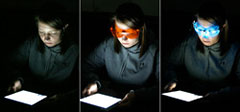 Study participants viewed the tablets
without goggles, through orange-tinted goggles capable of filtering out
radiation that can suppress melatonin, and through clear goggles fitted
with blue LEDs to suppress melatonin.
Study participants viewed the tablets
without goggles, through orange-tinted goggles capable of filtering out
radiation that can suppress melatonin, and through clear goggles fitted
with blue LEDs to suppress melatonin.
Melatonin is a hormone produced by the pineal gland at night and
under conditions of darkness in both diurnal and nocturnal species. It
is a timing messenger, signaling nighttime information throughout the
body. Exposure to light at night, especially short-wavelength light,
can slow or even cease nocturnal melatonin production. Suppression of
melatonin by light at night resulting in circadian disruption has been
implicated in sleep disturbances, increased risk for diabetes and
obesity, as well as increased risk for more serious diseases, such as
breast cancer, if circadian disruption occurs for many consecutive
years, such as in nightshift workers.
The LRC study shows that a two-hour exposure to electronic devices
with self-luminous backlit displays causes melatonin suppression, which
might lead to delayed bedtimes, especially in teens.
The research team, led by Mariana Figueiro, associate professor at
Rensselaer and director of the LRC's Light and Health Program, tested
the effects of self-luminous (backlit) tablets on melatonin
suppression. In order to simulate typical usage of these devices, 13
individuals used self-luminous tablets to read, play games, and watch
movies. Results of the study, titled "Light level and duration of
exposure determine the impact of self-luminous tablets on melatonin
suppression," were recently published in the journal Applied
Ergonomics.
"Our study shows that a two-hour exposure to light from
self-luminous electronic displays can suppress melatonin by about 22%.
Stimulating the human circadian system to this level may affect sleep
in those using the devices prior to bedtime," says Dr. Figueiro. "The
actual melatonin suppression values after 60 minutes were very similar
to those estimated using a predictive model of human circadian
phototransduction for one-hour light exposures. Based on these results,
display manufacturers can use our model to determine how their products
could affect circadian system regulation."
The results of this study, together with the LRC predictive model of
human circadian phototransduction, could urge manufacturers to design
more circadian-friendly electronic devices that could either increase
or decrease circadian stimulation depending on the time of day -
reducing circadian stimulation in the evening for a better night's
sleep, and increasing in the morning to encourage alertness. In the
future, manufacturers might be able to use data and predictive models
to design tablets for tailored daytime light exposures that minimize
symptoms of seasonal affective disorder and sleep disorders in seniors.
Individuals would be able to receive light treatments while playing
games or watching movies, making light therapy much more enjoyable than
just sitting in front of a light box.
Along with Dr. Figueiro, co-authors of the study are LRC Director
and Professor Mark S. Rea, LRC Research Specialist Brittany Wood, and
LRC Research Nurse Barbara Plitnick.
"Technology developments have led to bigger and brighter
televisions, computer screens, and cell phones," says Ms. Wood, who
used the study as the basis for her masters thesis. "To produce white
light, these electronic devices must emit light at short wavelengths,
which makes them potential sources for suppressing or delaying the
onset of melatonin in the evening, reducing sleep duration and
disrupting sleep. This is particularly worrisome in populations such as
young adults and adolescents, who already tend to be night owls."
In the study, the participants were divided into three groups. The
first group viewed their tablets through a pair of clear goggles fitted
with 470-nm (blue) light from light emitting diodes (LEDs). This was a
true positive condition because the blue light is known to be a strong
stimulus for suppressing melatonin. The second group viewed their
tablets through orange-tinted glasses, capable of filtering out the
short-wavelength radiation that can suppress melatonin; this was the
dark control condition. The third group did not wear glasses or
goggles. Each tablet was set to full brightness.
In order to accurately record personal light exposures during the
experiment, each subject wore a Dimesimeter close to the eye. The
Dimesimeter is a small calibrated light meter device developed by the
LRC that continuously records circadian light and activity levels. Last
year, international magazine The Scientist named the LRC's Dimesimeter
as one of the Top 10 Innovations of 2011.
The research team established that duration of exposure and the
distance between the eye and the display, which determines the amount
of light reaching the back of the eye, affects melatonin levels.
Melatonin suppression after one hour exposure to the tablet was not
significantly affected. However, after a two-hour exposure there was
significant suppression.
The type of task being performed on the tablets also determines how
much light is delivered to the cornea and, therefore, the impact on
evening melatonin levels. As shown by the teams Dimesimeter
measurements, the range of photopic illuminance levels at the cornea
from the tablets alone varied from 5 lux, which is not likely to affect
melatonin, to over 50 lux, which would result in measurable melatonin
suppression after a two-hour exposure. Therefore, before any
generalizations can be made, it is important to measure how much light
one is receiving from these self-luminous devices.
Until manufacturers develop more circadian-friendly electronic
devices that increase or decrease light exposure based on time of day,
Dr. Figueiro has several recommendations to reduce their effects on
sleep: "We recommended dimming these devices at night as much as
possible in order to minimize melatonin suppression, and limiting the
amount of time spent using these devices prior to bedtime," she
says.
The study was funded by Sharp Laboratories of America.
The Lighting Research Center (LRC) is part of Rensselaer Polytechnic
Institute of Troy, NY, and is a leading university-based research
center devoted to lighting, offering graduate education in lighting,
including one- and two-year master's programs and a Ph.D. program.
Link: Depending
on How Much and How Long, Light from Self-Luminous Tablet Computers Can
Affect Evening Melatonin, Delaying Sleep
How to Keep Your Mobile Phone Connected During
Severe Weather
PR: With Mississippi and Alabama residents and businesses
being pummeled by the onslaught of Hurricane Isaac this week, C Spire
Wireless offered some timely tips on how to make sure your mobile phone
or smartphone continues to work during severe weather conditions.
By following a few simple reminders, you'll be able to use your
mobile phone in any situation.
"We live in a wireless world so when severe weather or a natural
disaster strikes, individuals, families and emergency responders depend
on their wireless phones as a lifeline to the outside world," says Eric
Hollingsworth, vice president of Network Operations for C Spire
Wireless. "We are committed to providing our customers with the best
network coverage, but there are some simple steps they can take to
ensure that their device works in every situation."
When severe weather strikes, commercial power often is disrupted and
wireless networks must rely on back-up diesel generators and batteries.
While C Spire's network can operate for days without commercial power,
there is a tremendous increase in wireless traffic volumes during and
immediately after a storm as impacted customers use their mobile phones
for voice calls, text messages or browsing the web.
"We engineer and design our networks to handle large volumes of
traffic, but during these types of emergencies and natural disasters,
there is unprecedented demand for service from outside and inside the
affected areas," says Hollingsworth. "By following a few simple
reminders, you'll be able to use your mobile phone in any
situation."
Hollingsworth says there are six easy steps consumers can take to
stay connected to family and friends during and after a storm or
natural disaster.
- Place voice calls only when necessary; limit non-emergency calls to
conserve battery power and free up wireless networks for emergency
agencies and first responders.
- Send brief text messages rather than voice calls. Text messages
require less network capacity and are more likely than voice calls to
reach their destination during periods of high network congestion.
- Charge your primary wireless phone battery in advance of the storm
and secure back-up batteries and either a vehicle charger or portable
battery charger.
- Keep your mobile phone, batteries, chargers and other equipment in
a dry, accessible location. Use waterproof accessories or simple
zip-lock storage bags to protect your device.
- Use your phone only when you really need it. When the battery is
extremely low, turn phone off unless in use.
- Turn down the brightness on your mobile phone screen and turn off
services that you don't use.
To help customers prepare for a potential hurricane and its
aftermath, C Spire has activated its mobile website with links and
information on weather, traffic, evacuation routes, gasoline
availability, power outages, school closings, hotel information, news,
maps, and more. The site can be accessed through the mobile web at
www.cspire.com/storm on a
mobile phone or with a personal computer at http://www.cspire.com/hurricane
C Spire also has activated its #STORM hotline, which is accessible
by dialing #78676 from a mobile phone or by calling toll-free
1.888.276.8845. Customers can also get updates on the network and other
news via social links by following the company on Facebook and Twitter.
The company is coordinating its emergency response preparations with
local, state and federal agencies, including the Mississippi Emergency
Management Agency, the Alabama Emergency Management Agency and the
offices of Mississippi Gov. Phil Bryant and Alabama Gov. Robert
Bentley.
C Spire Wireless is a Mississippi-based regional carrier
with nationwide CDMA coverage that carries the iPhone and offers
unlimited data plans at very competitive rates.
Link: C Spire
Wireless
Do-It-Yourself iPhone 4S Battery Replacement
iMore's Allyson Kazmucha says if battery life in your iPhone 4S is
getting worse and worse, or it just won't hold a charge, you can easily
perform a DIY replacement, allowing you to get lots more life out of
your device and prevent having to buy a new iPhone before you
absolutely have to. If you're soon to be out of warranty or otherwise
not covered for exchange or replacement, or if you're just a DIY type
who wants to learn more about the inner workings of your iPhone, this
tutorial has you covered.
Link: How to Replace
the Battery in an iPhone 4S
Who Inherits Your iTunes Library?
SmartMoney's Quentin Fottrell chronicles yet another issue where the
copyright paradigms developed in the 19th and 20th centuries are
woefully inadequate and inappropriate for the digital era of the
21st.
Fottrell notes that many of us will accumulate vast libraries of
digital books and music over the course of our lifetimes, but when we
die, our collections of words and music may expire with us.
He observes that while someone who owned 10,000 hardcover books and
the same number of vinyl records could bequeath them to descendants,
legal experts say passing on iTunes and Kindle libraries would be much
more complicated, and one's heirs stand to lose huge sums of money.
Publisher's note: Nonsense, nobody is going to "lose huge sums of
money" because of this. Just make sure your heirs have your account ID
and password, and there should be no problem continuing to use the
ebooks, music, videos, and apps linked to that account. dk
Link: Who Inherits
Your iTunes Library?
Rumor Roundup
Summary of New iPhone Rumors
The French blogsite NowhereElse.fr has posted a fantastic
infographic (in French and English) summarizing the main rumors at
the time revolved around the release of the iPhone 5 and accompanying
each with a probability percentage.
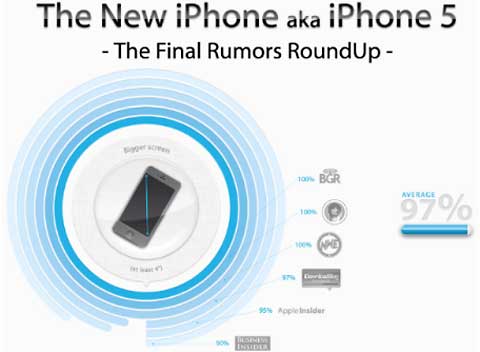 Editor Steve
Hemmerstoffer invited some renowned colleagues to join them in the game
of prognosis, with Sebastien Page and Cody Lee of iDownloadBlog, Steve
Kovach of Business Insider, Buster Heine of Cult of Mac, Zach Epstein
of BGR, and Mikey Campbell to AppleInsider agreeing to participate, and
the beautiful graphics artwork credited to Yoann "Dne" Madec and Solne
"Sosoa" Renaudin.
Editor Steve
Hemmerstoffer invited some renowned colleagues to join them in the game
of prognosis, with Sebastien Page and Cody Lee of iDownloadBlog, Steve
Kovach of Business Insider, Buster Heine of Cult of Mac, Zach Epstein
of BGR, and Mikey Campbell to AppleInsider agreeing to participate, and
the beautiful graphics artwork credited to Yoann "Dne" Madec and Solne
"Sosoa" Renaudin.
Publisher's note: Beauty is in the eye of the beholder, and ring/donut/concentric
circle graphs are much more difficult to comprehend than bar
charts, although they certainly can look prettier. As a disciple of
Edward Tufte, I
can only say that simpler is better. dk
Link: The New iPhone
Final Rumors Roundup
New iPhone Launch in September, iPad mini in
October
AllThingsD's John Paczkowski reports that Apple's new 7.85" iPad
mini will be launched at a separate event in October, subsequent to the
next iPhone's September 12 announcement.
It seems logical to the point of no-brainerness that Apple would
choose to separate two huge new iOS device announcements rather than
dilute their news cycle impact, to say nothing of supply channel
logistics.
Link: Confirmed: New
iPad mini to Debut in October, After Latest Apple iPhone's September
Bow
Official Name of iPad mini to Be 'iPad mini'
The Japanese Apple-watcher blog Macotakara's Danbo reports that
according to Asian source, the name of Apple's new smaller form factor
product, which is expected to have 7.85" display and has been
provisionally referred to by rumoristas, bloggers, and enthusiasts as
"iPad mini," actually will be named "iPad mini" officially.
Macotakara's source expects that the "iPad" logo will be printed on
back of case similarly to "iPod" being printed on iPod nano and iPod
touch.
Danbo also relays an interesting rumor that the "new iPad" will be
replaced with a micro-dock equipped one, and a Japanese mobile operator
(which currently operates the iPhone 4S but not iPad) will add this new
iPad to their lineup.
Link: iPad
miniの名称は、やはりiPad
mini? (Japanese-to-English
translation by Google Translate)
The Competition
Amazon Expected to Unveil New Kindles at Sept. 6
Media Event
AppleInsider's Sam Oliver reports that Amazon has announced it will
hold a media event on Sept. 6, prompting speculation that the company
plans to unveil a new lineup of Kindle tablets and e-readers.
Link: Amazon Expected to
Unveil New Kindles at Sept. 6 Media Event
Samsung Galaxy Note 10.1 Designed for Higher
Margins than iPad
PR: IHS iSuppli's senior director of teardown services Andrew
Rassweiler reports that Samsung's Galaxy Note 10.1 could deliver a
better margin than the market-leading iPad - but only if Samsung can
maintain its target selling prices - according to a physical dissection
of the media tablet conducted by information and analytics provider
IHS's Teardown Analysis Service.
Rassweiler says a preliminary analysis of the component cost of the
Galaxy Note 10.1 reveals the HSPA+ version of the media tablet carries
a bill of materials (BOM) of $283. When basic manufacturing costs are
added in, the cost to produce the tablet increases to $293 for a device
that sells for approximately $640 in the world market.
The table below presents the preliminary results of the IHS iSuppli
teardown analysis of the Samsung Galaxy Note 10.1 media tablet. Note
that this teardown assessment is preliminary in nature, accounts only
for hardware and manufacturing costs and does not include additional
expenses such as software, licensing, royalties or other
expenditures.
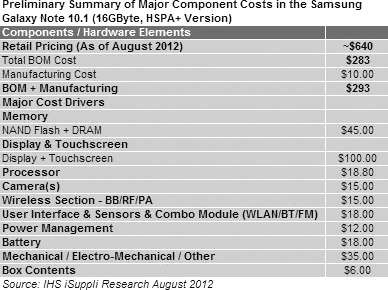 For the WiFi-only version of
the Galaxy Note 10.1, the BOM is estimated to decline to about $260. US
retail pricing for this version has been announced at $499.
For the WiFi-only version of
the Galaxy Note 10.1, the BOM is estimated to decline to about $260. US
retail pricing for this version has been announced at $499.
For comparison, a similarly equipped third-generation New iPad with
WiFi and 16 GB of NAND flash memory carried a cost of $316 at the time
of release and a retail price of $499. Consequently, Samsung should be
able to garner a larger margin on the Galaxy Note 10.1 than Apple did
for the New iPad - at least on paper.
"With the Galaxy Note 10.1, Samsung continues to seek the magic
formula for a media tablet that can rival the iPad's market
penetration," says Rassweiler. "And where some other tablets introduced
in recent times generated small or no hardware profit, the Galaxy Note
10.1 could turn a decent per unit margin for Samsung, and stands to be
a money maker - if the company can extend the recent success of the
Samsung Galaxy Note smartphone to its tablet line."
At their original sales prices and BOMs, the Google Nexus 7 and the
Amazon Kindle Fire generated little or no hardware profit - instead
trying to make money using more complex business models involving
online services.
However, maintaining the opening sales price over time has proven to
be the Achilles heel of many a vendor.
"The hardware profit margin for the Galaxy Note 10.1 only holds true
if Samsung is able to maintain its initial price. And therein lies the
rub: no Apple rival has yet demonstrated the capability to actually
sell in volume at $499, instead falling back on price cuts in order to
drive volume," says Rhoda Alexander, director, tablet and monitor
research for IHS.
Samsung Inside
As IHS recently noted, one of Apple's major competitive advantages
is its dominance in semiconductor spending. This allows Apple to
command more favorable pricing from its suppliers, helping to reduce
its costs and expand its profit margins. However, Samsung can counter
this advantage by leveraging its own internal sources of supply.
"Samsung is a behemoth in the electronic industry and its
competitive strength lies in its control, via internal sourcing, of a
large percentage of the components that go into its final products,"
Rassweiler observes. "This allows Samsung to keep costs down, while
delivering competitive differentiation. The company's internal sourcing
strategy is certainly in evidence in the Galaxy Note 10.1, where
Samsung supplies the memory - both flash and DRAM - as well as the core
processor, battery and many other components.
Furthermore, some of the key components in the Galaxy Note 10.1 that
are sourced from other suppliers are identical to devices found in
other current Samsung products.
By using cross-platform components, Samsung can better leverage
pricing with outside suppliers, and further reduce the incremental cost
of developing other devices, Rassweiler observed.
The Galaxy Note 10.1 features a quad-core Samsung Exynos processor,
the same recently found in the Samsung Galaxy S III handset. The tablet
also has the same Intel Corp. wireless chipset found in the Galaxy S
III, which includes the PMB9811 and PMB5712 devices.
No Technological Trailblazer
The IHS iSuppli teardown of the Samsung Galaxy Note 10.1 reveals the
tablet isn't breaking new ground in terms of technology. As is usually
the case with such hardware releases, each device offers only an
incremental set of improvements compared to the previous
generation.
However, the new Samsung Galaxy Note 10.1 in some regards does up
the ante for media tablet hardware. The new-generation quad-core
processor is sure to make a tangible performance improvement, and will
be the main upgrade driver for many consumers.
A feature that the iPad does not have but which the Galaxy Note 10.1
possesses is the hybrid touch screen, which features not only
conventional capacitive touch sensing, but also gives users the option
of using a Wacom digitizer pen. Wacom's pen is passive: it requires no
battery or power source, or cords - like a mouse - but works using
inductive pen sensing. Essentially one can use the Galaxy note to write
on, but still utilize it as a conventional touch tablet.
Battery Charge Up
Samsung supplied its own battery pack, which features
higher-than-average energy density for a Li-Polymer battery pack at
about 520 Wh/L energy density, compared to the typical 450 Wh/L for
Li-Polymer.
Beyond the BOM
Although the IHS iSuppli Teardown Analysis Service bill of materials
numbers might lead some to conclude that Samsung stands to make about
50 points of margin on this Galaxy Note 10.1, there are more cost
pieces to this puzzle than materials and manufacturing costs.
As IHS always notes, our BOM costs do not include non-material and
other expenses, such as software and development. Once these additional
costs are factored in, what might appear to produce a massive margin
for Apple and Samsung is somewhat smaller.
As recent court documents surfacing from the patent battles between
Apple and Samsung show, Apple's gross margins for the iPad are not
nearly as high as those for the iPhone. Based on IHS iSuppli BOM
estimates and expected retail prices, Samsung may be able to yield
slightly better margins per unit than Apple on this product.
IHS iSuppli's market intelligence helps technology companies achieve
market leadership. Catch the latest teardown, BOM cost, bill of
materials from all across the world straight from our immensely
experienced analysts. iSuppli provides comprehensive IHS iSuppli's
Teardown portal provides deeper insights into bill of materials, BOM
cost, photo analysis and graphical representation of electronics.
Link: Samsung Galaxy
Note 10.1 Aims for Higher Margins than iPad, IHS iSuppli Teardown
Reveals
Apps & Services
QikShare for iOS: Quickly Share Your Dropbox Files
with Bump
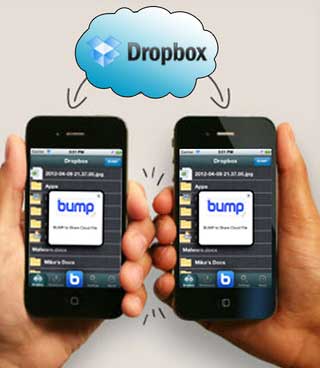 PR:
iVinnyApps has introduced QikShare 1.0, its new productivity app for
iOS devices. QikShare is simple. It lets you navigate your Dropbox files and quickly bump them to other
users, then the file automatically downloads to the recipients device
and uploads to their Dropbox. If you don't want to "bump" then you can
email them or view the files. You can even print the files. For those
not familiar with "bump", it is an NFC-like technology that lets you
share data with a physical touch (a bump motion) between two
devices.
PR:
iVinnyApps has introduced QikShare 1.0, its new productivity app for
iOS devices. QikShare is simple. It lets you navigate your Dropbox files and quickly bump them to other
users, then the file automatically downloads to the recipients device
and uploads to their Dropbox. If you don't want to "bump" then you can
email them or view the files. You can even print the files. For those
not familiar with "bump", it is an NFC-like technology that lets you
share data with a physical touch (a bump motion) between two
devices.
Features
- Bump integration
- Dropbox integration
- Printing files
- Emailing files
- Opening files in other apps
Bumping iPhones has a simplicity and futuristic attraction that many
will find appealing. The user interface is very stylish and attractive.
The big "b" button in the center of the TabBar just screams "Tap Me!".
Users will figure out how to use the app fairly quickly because the
actions that can be performed five you the next step. (i.e.: clicking
on a file asks you whether you want to Bump or View. When you open the
app it asks you to connect to Dropbox.) There are very few apps that
are as simple and useful as this app. it has great potential to become
a verb in and of itself.
Device Requirements:
- iPhone 3GS, iPhone 4, iPhone 4S, 3/4G iPod touch and iPad
- Requires iOS 5.1 or later
- 6.6 MB
QikShare 1.0 is 99¢ (or equivalent amount in other currencies)
and available worldwide exclusively through the App Store in the
Productivity category.
Link:
QikShare
Postcard - Individually Designed, Sent Worldwide
Lets Users Send Real Postcards with Custom Photos and Personal
Signature
 PR: iOS device users who want to send
a truly memorable greeting to a friend, family member, acquaintance,
customer, or anyone else can easily do so by downloading the new app
Postcard - Individually Designed, Sent Worldwide.
PR: iOS device users who want to send
a truly memorable greeting to a friend, family member, acquaintance,
customer, or anyone else can easily do so by downloading the new app
Postcard - Individually Designed, Sent Worldwide.
Designed by vukee, Postcard - Individually Designed, Sent Worldwide
lets users send a stamped postcard bearing their personal signature to
anyone in the world. They simply choose photos from their archive,
Facebook, or Instagram, then use the app's interface to create a truly
memorable postcard.
Once finished, they select the addressee from their address book,
add their signature for a personal touch, purchase postage via PayPal
or credit card, and enjoy quick worldwide distribution.
"While electronic communication such as email can be an effective
way to communicate, for some occasions nothing can replace the
unique pleasure of receiving a personalized postcard from someone
who cares," comments Merle Dehn of vukee. "Postcard - Individually
Designed, Sent Worldwide is a blend of the old and the new. 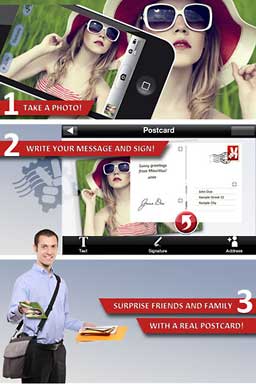 It captures the traditional fun and pleasure
of postcards, and brings it into the 21st century with digital
signatures, customized photos, electronic postage payment, and mobile
device technology. The app is perfect for sending invitations, sharing
vacation experiences, businesses that want to reach their customers in
a unique way, and so much more."
It captures the traditional fun and pleasure
of postcards, and brings it into the 21st century with digital
signatures, customized photos, electronic postage payment, and mobile
device technology. The app is perfect for sending invitations, sharing
vacation experiences, businesses that want to reach their customers in
a unique way, and so much more."
Postcard - Individually Designed, Sent Worldwide is available at
iTunes.
Users also enjoy a money back guarantee if they aren't 100%
satisfied. Since its release, the app has garnered 5-star reviews from
satisfied users
The app, which is offered in English, Chinese, Dutch, French,
German, Italian, Japanese, Korean, Portuguese, Russian, Spanish,
Swedish, Turkish, is compatible with iPhone 3GS, iPhone 4, iPhone 4S,
iPod touch (3rd generation), iPod touch (4th generation) and iPad, and
requires iOS 4.2 or later.
Link:
Postcard - Individually Designed, Sent Worldwide
Accessories
iTypewriter: Retro Input for Cutting-Edge
iPad
PR: Edinburgh-based product and Industrial designer Austin
Yang's iTypewriter is a typewriter for the iPad for users who enjoy the
old feeling of typing and also the latest technology.
Yang notes that older users who've never used a computer or iPad can
use this familiar typewriter input device and type in the familiar
typewriter operation way, for a specific group of users providing an
easier way to type on the iPad. He also notes an nostalgia dynamic
whereby veteran users can recollect old experiences and memories
invoked through the device's familiar appearance and haptic feedback.
Instead of stroking on the screen with no feedback, this product
provides strong haptic feedback as users experience the physical
strength transfer from the keypad to the movement of each key
YouTube video: http://www.youtube.com/watch?v=e42ylHtkQ5M
Does it come with White Out?
Link: iTypewriter
CruxSKUNK Transforms iPad into MacBook Air
Surrogate Laptop
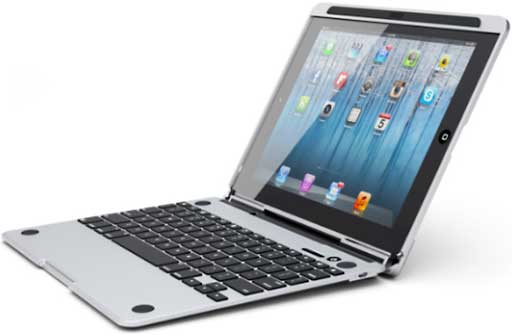 PR: Brian
Probst's CruxCase CruxSKUNK turns your iPad into a powerful laptop that
he says skunks all other keyboards, hence the unlikely name,
PR: Brian
Probst's CruxCase CruxSKUNK turns your iPad into a powerful laptop that
he says skunks all other keyboards, hence the unlikely name,
Probst notes that Crux has been busy making keyboard cases for iPads
for about two years now, and needless to say they've learned a lot
about design, manufacturing, and getting a product to market. The
CruxSKUNK is the culmination of everything they've learned, he says,
claiming that no other keyboard case can touch the fit, finish,
attention to aesthetics, and detail that they've put into the
CruxSKUNK, with over eight patents pending on the technology that comes
in the device, which maintains the simplicity of the iPad while staying
true to Apple's design aesthetic and perfectly compliments the style of
the iPad. He says most people who've shown the CruxSKUNK to have
mistaken it for a MacBook Pro.
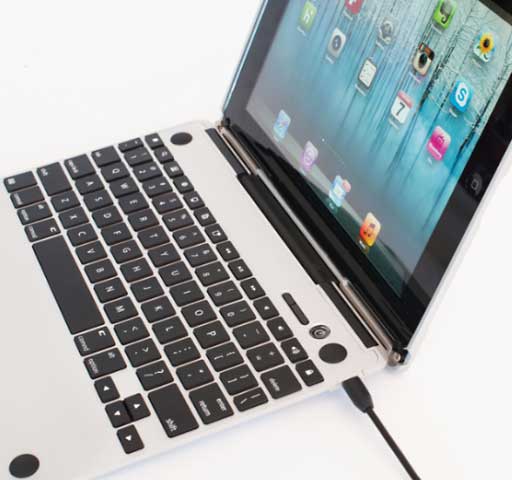 At 19 mm, the
CruxSKUNK and iPad combination is about as thin as a MacBook Air and
weighs about the same, so it's just as easy to carry around, and the
CruxSKUNK's 6 mm base is claimed to be the thinnest keyboard for your
iPad on the planet. This full-sized QWERTY keyboard is raised above the
plane of the surrounding aluminum and has special function keys at the
top for frequently-used functions .
At 19 mm, the
CruxSKUNK and iPad combination is about as thin as a MacBook Air and
weighs about the same, so it's just as easy to carry around, and the
CruxSKUNK's 6 mm base is claimed to be the thinnest keyboard for your
iPad on the planet. This full-sized QWERTY keyboard is raised above the
plane of the surrounding aluminum and has special function keys at the
top for frequently-used functions .
For Bluetooth connectivity you'll only have to go through the
pairing process once with your iPad, which will thereafter remember
your CruxSKUNK .
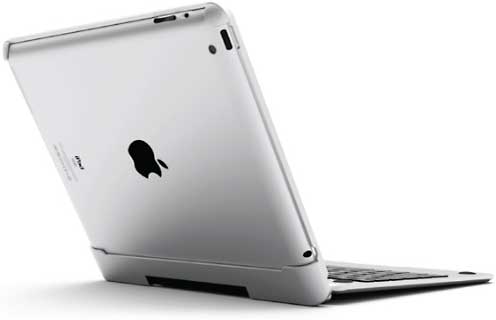 The CruxSKUNK
features a patent-pending hinge that allows for 360 degrees of
rotation, letting you use your iPad in a multitude of positions.
The CruxSKUNK
features a patent-pending hinge that allows for 360 degrees of
rotation, letting you use your iPad in a multitude of positions.
The three main parts of the CruxSKUNK are machined from a single
piece of aircraft grade aluminum in the exact same process that Apple
machines its MacBooks and iPads. The Aluminum parts are then
sandblasted and anodized to give them the same finish as the iPad.
Probst says they plan to have their first production samples coming
off of the production line in the middle of October. Once all of the
samples and components check out they'll begin full production late
October. The device's various components will be manufactured and
assembled in China where some thermoplastic hardware parts for the
CruxSKUNK - hinges, hinge covers, keyboard, buttons, rubber feet and
pads, PCB, battery, weight, and other small screws and hardware parts
are in production and ready to go.
 All that's left is to start
machining the aluminum parts and commence final assembly and packaging,
the plan being to have the CruxSKUNK shipping at the beginning of
December, just in time for Christmas.
All that's left is to start
machining the aluminum parts and commence final assembly and packaging,
the plan being to have the CruxSKUNK shipping at the beginning of
December, just in time for Christmas.
Probst says the CruxSKUNK's 350 mAH battery need only to be charged
once a month, and the device is compatible with both the the iPad 2 and
3rd generation New iPad. The CruxSKUNK automatically turns your iPad on
and off as you open and close the case, and features foam padding on
parts that touch your iPad.
Link: CruxSKUNK
Us+U Swivel ProFolio Case for the New iPad
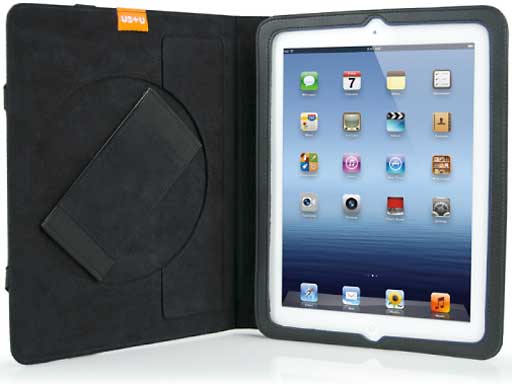 PR: Us+U has launched its Swivel ProFolio
for the third-generation iPad. This case utilizes the Us+U
patent-pending Swivel Technology handle that gives users the freedom to
rotate the iPad 360 degrees in any direction, while holding it in one
hand.
PR: Us+U has launched its Swivel ProFolio
for the third-generation iPad. This case utilizes the Us+U
patent-pending Swivel Technology handle that gives users the freedom to
rotate the iPad 360 degrees in any direction, while holding it in one
hand.
Swivel ProFolio features a self-adjusting hand strap, center-mounted
pivot and a hinged back panel to give users easy access to any angle
that they want or need, whether they're taking notes during a meeting
or catching up on their favorite television show at home or on the
go.
According to Brian May, Us+U Founder and Lead Designer, "We wanted
to take the existing success of the previous model and rework it to
make it even better than it was before."
Features
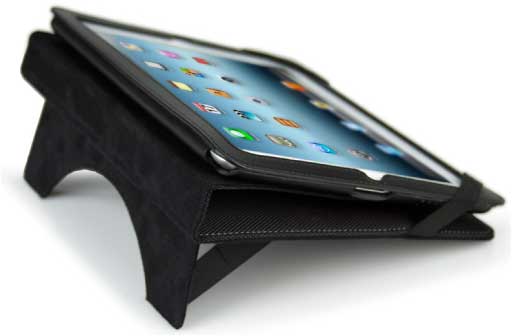 Rotating Handle: The fully
rotating/swiveling handle is completely self-adjusting. The
self-adjusting hand strap (handle) is designed to avoid annoying Velcro
sounds. This key design feature is paramount in professional business
situations, and allows users to effectively use their iPads without
calling so much attention to them.
Rotating Handle: The fully
rotating/swiveling handle is completely self-adjusting. The
self-adjusting hand strap (handle) is designed to avoid annoying Velcro
sounds. This key design feature is paramount in professional business
situations, and allows users to effectively use their iPads without
calling so much attention to them.
Work Mode: The built-in, flush-mount kickstand is perfect for
typing on the iPad's keyboard or for viewing the iPad's screen at a
lower angle. The Swivel ProFolio's typing kickstand also has a
convenient center cutout, perfect for using the iPad while resting it
on one leg.
Corporate Use: The Swivel ProFolio is an ideal iPad case for
commercial, enterprise and personal use. Us+U says both the Swivel Pro
and Swivel ProFolio iPad cases for the iPad 1 and iPad 2 are in use at
some of America's largest companies, ranging from pharmaceutical and
healthcare to automotive and financial industries. The new Swivel
ProFolio can accommodate both the iPad 2 and iPad 3.
 Video Mode: The Swivel ProFolio's design
accommodates multiple upright angles for watching videos or using the
iPad in an upright viewing angle. The ability to adjust the upright
angle is key to any iPad case's versatility. Whether the user is
reading, sitting at a desk or lying in bed, or in the kitchen or
workshop, the correct angle of viewing always enhances the
experience.
Video Mode: The Swivel ProFolio's design
accommodates multiple upright angles for watching videos or using the
iPad in an upright viewing angle. The ability to adjust the upright
angle is key to any iPad case's versatility. Whether the user is
reading, sitting at a desk or lying in bed, or in the kitchen or
workshop, the correct angle of viewing always enhances the
experience.
 Pocket/Pen Holder: The external pocket on
the front of the Swivel ProFolio iPad case is convenient for holding
business cards, notes, receipts, etc. Because this iPad case will hold
a pen/stylus, the packet is perfect for holding a small notepad.
Pocket/Pen Holder: The external pocket on
the front of the Swivel ProFolio iPad case is convenient for holding
business cards, notes, receipts, etc. Because this iPad case will hold
a pen/stylus, the packet is perfect for holding a small notepad.
The Swivel ProFolio is available now for $69.99.
Link:
Us+U Swivel ProFolio Case for the New iPad

 Study participants viewed the tablets
without goggles, through orange-tinted goggles capable of filtering out
radiation that can suppress melatonin, and through clear goggles fitted
with blue LEDs to suppress melatonin.
Study participants viewed the tablets
without goggles, through orange-tinted goggles capable of filtering out
radiation that can suppress melatonin, and through clear goggles fitted
with blue LEDs to suppress melatonin.
 For the WiFi-only version of
the Galaxy Note 10.1, the BOM is estimated to decline to about $260. US
retail pricing for this version has been announced at $499.
For the WiFi-only version of
the Galaxy Note 10.1, the BOM is estimated to decline to about $260. US
retail pricing for this version has been announced at $499. PR:
iVinnyApps has introduced QikShare 1.0, its new productivity app for
iOS devices. QikShare is simple. It lets you navigate your
PR:
iVinnyApps has introduced QikShare 1.0, its new productivity app for
iOS devices. QikShare is simple. It lets you navigate your  PR: iOS device users who want to send
a truly memorable greeting to a friend, family member, acquaintance,
customer, or anyone else can easily do so by downloading the new app
Postcard - Individually Designed, Sent Worldwide.
PR: iOS device users who want to send
a truly memorable greeting to a friend, family member, acquaintance,
customer, or anyone else can easily do so by downloading the new app
Postcard - Individually Designed, Sent Worldwide. It captures the traditional fun and pleasure
of postcards, and brings it into the 21st century with digital
signatures, customized photos, electronic postage payment, and mobile
device technology. The app is perfect for sending invitations, sharing
vacation experiences, businesses that want to reach their customers in
a unique way, and so much more."
It captures the traditional fun and pleasure
of postcards, and brings it into the 21st century with digital
signatures, customized photos, electronic postage payment, and mobile
device technology. The app is perfect for sending invitations, sharing
vacation experiences, businesses that want to reach their customers in
a unique way, and so much more." PR: Brian
Probst's CruxCase CruxSKUNK turns your iPad into a powerful laptop that
he says skunks all other keyboards, hence the unlikely name,
PR: Brian
Probst's CruxCase CruxSKUNK turns your iPad into a powerful laptop that
he says skunks all other keyboards, hence the unlikely name, At 19 mm, the
CruxSKUNK and iPad combination is about as thin as a MacBook Air and
weighs about the same, so it's just as easy to carry around, and the
CruxSKUNK's 6 mm base is claimed to be the thinnest keyboard for your
iPad on the planet. This full-sized QWERTY keyboard is raised above the
plane of the surrounding aluminum and has special function keys at the
top for frequently-used functions .
At 19 mm, the
CruxSKUNK and iPad combination is about as thin as a MacBook Air and
weighs about the same, so it's just as easy to carry around, and the
CruxSKUNK's 6 mm base is claimed to be the thinnest keyboard for your
iPad on the planet. This full-sized QWERTY keyboard is raised above the
plane of the surrounding aluminum and has special function keys at the
top for frequently-used functions . The CruxSKUNK
features a patent-pending hinge that allows for 360 degrees of
rotation, letting you use your iPad in a multitude of positions.
The CruxSKUNK
features a patent-pending hinge that allows for 360 degrees of
rotation, letting you use your iPad in a multitude of positions. All that's left is to start
machining the aluminum parts and commence final assembly and packaging,
the plan being to have the CruxSKUNK shipping at the beginning of
December, just in time for Christmas.
All that's left is to start
machining the aluminum parts and commence final assembly and packaging,
the plan being to have the CruxSKUNK shipping at the beginning of
December, just in time for Christmas. PR: Us+U has launched its Swivel ProFolio
for the third-generation iPad. This case utilizes the Us+U
patent-pending Swivel Technology handle that gives users the freedom to
rotate the iPad 360 degrees in any direction, while holding it in one
hand.
PR: Us+U has launched its Swivel ProFolio
for the third-generation iPad. This case utilizes the Us+U
patent-pending Swivel Technology handle that gives users the freedom to
rotate the iPad 360 degrees in any direction, while holding it in one
hand. Rotating Handle: The fully
rotating/swiveling handle is completely self-adjusting. The
self-adjusting hand strap (handle) is designed to avoid annoying Velcro
sounds. This key design feature is paramount in professional business
situations, and allows users to effectively use their iPads without
calling so much attention to them.
Rotating Handle: The fully
rotating/swiveling handle is completely self-adjusting. The
self-adjusting hand strap (handle) is designed to avoid annoying Velcro
sounds. This key design feature is paramount in professional business
situations, and allows users to effectively use their iPads without
calling so much attention to them. Video Mode: The Swivel ProFolio's design
accommodates multiple upright angles for watching videos or using the
iPad in an upright viewing angle. The ability to adjust the upright
angle is key to any iPad case's versatility. Whether the user is
reading, sitting at a desk or lying in bed, or in the kitchen or
workshop, the correct angle of viewing always enhances the
experience.
Video Mode: The Swivel ProFolio's design
accommodates multiple upright angles for watching videos or using the
iPad in an upright viewing angle. The ability to adjust the upright
angle is key to any iPad case's versatility. Whether the user is
reading, sitting at a desk or lying in bed, or in the kitchen or
workshop, the correct angle of viewing always enhances the
experience. Pocket/Pen Holder: The external pocket on
the front of the Swivel ProFolio iPad case is convenient for holding
business cards, notes, receipts, etc. Because this iPad case will hold
a pen/stylus, the packet is perfect for holding a small notepad.
Pocket/Pen Holder: The external pocket on
the front of the Swivel ProFolio iPad case is convenient for holding
business cards, notes, receipts, etc. Because this iPad case will hold
a pen/stylus, the packet is perfect for holding a small notepad.
